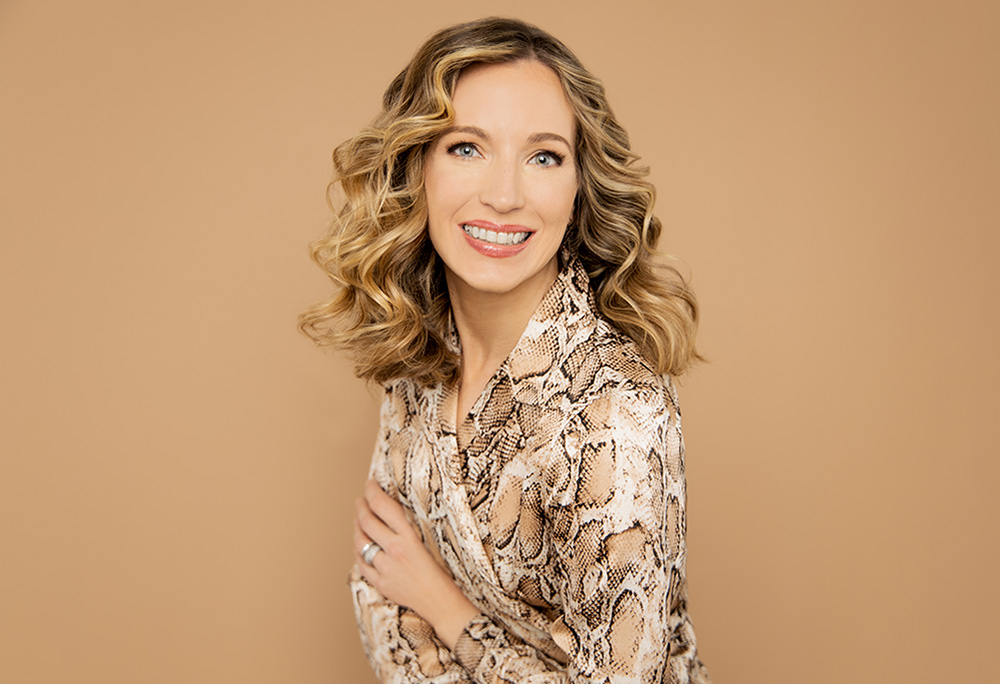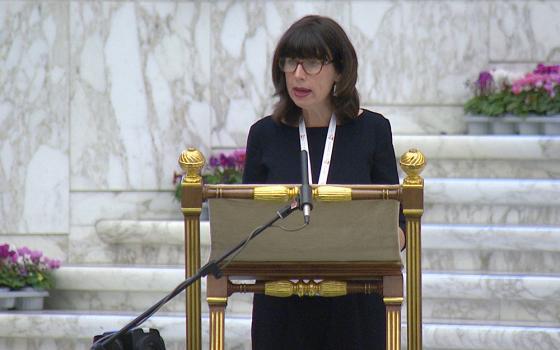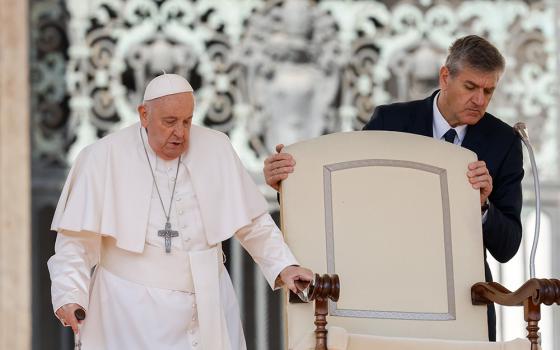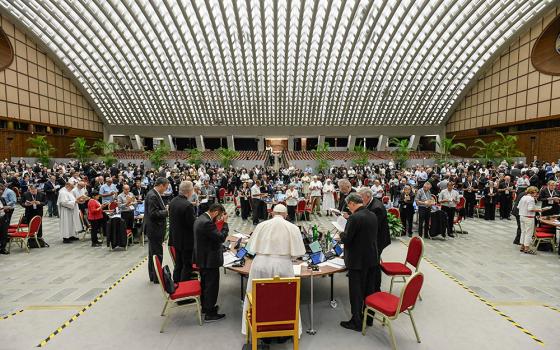
American sociologist Tricia Bruce, president-elect of the Association for the Sociology of Religion, is among six consultors named to the General Secretariat of the Synod Feb. 17. (Courtesy of Tricia Bruce)
As a sociologist who studies American Catholicism, Tricia Bruce knows that her work often ends up summarized in negative headlines — about young people rejecting religion, or polarized groups in the church, or priests who don't trust their bishops.
But she believes that despite sometimes being the bearers of bad news, sociologists — by giving voice to collective experiences — are essential to the church's work. Now Bruce hopes to bring her expertise, and data from her work, to the yearslong synodal process, as one of six new consultors named to the Vatican's General Secretariat of the Synod.
"I don't believe that popular opinion equals the right opinion, or that the empirical reality, as it is, is equal to the empirical reality as it ought to be," Bruce told NCR. "But if we only operate in the landscape of ideas and hopes, then we're not actually connecting to people in their embodied, incarnate experiences and lives."
Bruce has studied those "incarnate experiences," from parish life to priesthood, from abortion to adoption, from women's roles and the diaconate, to lay movements such as Voice of the Faithful. And while U.S. Catholics do hold a wide range of opinions, she believes they may not be as polarized as often portrayed.
Her appointment was made in February, at the same time the Vatican announced that the synodal process will continue with study of some themes that emerged in last October's meetings, before final meetings this October 2-27.
Of the secretariat's 16 total consultors, most are theologians. But Bruce believes the social sciences also have a role in a process that is, after all, about trying to discern and listen to a wide variety of perceptions, beliefs and experiences.
'I never approach my work as an activist or advocate. I approach it as a sociologist attempting to amplify a wide array of voices.'
"In thinking about my role in the synod, I can say, 'What kinds of questions are we asking? What kind of assumptions do we have?' And that maybe it's possible that some of those assumptions are incorrect because they're based on older models of how we talk about and understand religion and spirituality."
Bruce, who lives in Knoxville, Tennessee, is affiliated with the University of Notre Dame's Center for the Study of Religion and Society and was recently named director of Springtide Research Institute, which tracks generational trends among young people ages 13-25. The institute has published an annual report on the state of religion and young people since 2020. Bruce is herself the mom of two middle-schoolers.
Already Bruce's appointment has received pushback from conservative groups concerned about her research. All three women who were named consultors Feb. 17 — Bruce, Medical Mission Sr. Birgit Weiler of Peru and Maria Clara Lucchetti Bingemer of Brazil — were labeled as "dissenters" by Bill Donohue of the Catholic League. The organization also criticizes NCR.
Donohue accused Bruce of "endorsing" the group Voice of the Faithful, which he also called "dissident," and said Bruce favors women deacons. Bruce has authored studies on both topics, although the studies contain others' opinions, not hers.
The study on women and the diaconate, "Called to Contribute," featured in-depth interviews with 40 women whose service to the church overlapped with core diaconal functions, such as liturgy and charitable work. It was funded by the group Discerning Deacons, which advocates the readmission of women to the diaconate.
Some interviewees did share "a heavy lament that they — their words, not mine — have been unable to fulfill a call to God and the church that they feel to their core," Bruce said. The report also summarized the ways women live out those calls within the current constraints. It did not include Bruce's own opinions.
Advertisement
"I never approach my work as an activist or advocate," said Bruce, who is also president-elect for the Association for the Sociology of Religion. "I approach it as a sociologist attempting to amplify a wide array of voices."
Her book on nonterritorial "personal parishes," included profiles of parishes with the traditional Latin Mass as well as ones for Vietnamese Catholics, for tourists and others. That book won a first-place award from the Catholic Press Association in 2018.
While Bruce acknowledges that U.S. Catholics often have "sharply contrasting views," she also believes that the perception of polarization — and the fear of it — is overstated. Social scientific studies reveal that "oftentimes people hold less extreme positions, or they hold a deep ability to empathize, to listen or to understand other aspects of an issue."
For example, in a study about abortion attitudes, funded by Notre Dame's McGrath Institute for Church Life, Bruce's team heard complex and nuanced responses that did not easily fit the labels "pro-life" and "pro-choice."
"It's easy to rely on labels that put us into clear camps, but it makes us seem more extreme than we are," she said. "But when you start to actually go beyond that first line of questioning about an issue, people will begin to share things that create an opportunity for common ground in a way that choosing a side never will."
She believes a misguided fear of polarization can "divide before a conversation even takes place."
"When we lead with a frame of polarization, we're afraid to talk about hard things, and that makes it difficult to move forward," she said.
Bruce grew up in a military family and spent her childhood repeatedly picking up and starting over. One constant was the Catholic Church. "Everywhere we went, the church was there," she said.
But her diverse experiences also led to the realization that "everyone is not the same as we are" and fostered a curiosity about those differences. Sociology became a way for her to "sort through the big questions without necessarily having to have answers to them."
"There's something really lovely about being a sociologist who can gather data and then hand them off to people in decision-making positions, who are then flying the plane," she said. "But, of course, you can't fly the plane if you don't have the chart, the map and the understanding of what the atmosphere looks like."
Her academic career has always been public-facing, because she believes sociological information must be accessible and usable. "Otherwise, we're not fulfilling one of the highest purposes of sociology, which is to allow people to better understand themselves and their world, and as a result to shape it."
Bruce doesn't see herself as the shaper, but rather the "sharer."
She acknowledges that the current tendency to self-select into groups of like-minded people — even at church — results in a lost opportunity to have conversations that might help create empathy. And she said she is "thrilled" about the synod process, which brings Catholics together across the ideological spectrum for such conversations.
"This spirit of willingness to be engage and talk is a vital first step," she said. "I don't think the result of this process is that suddenly we're all going to be on the same page. But I do think that by coming together and actually being able to see each other as fellow humans and fellow Catholics, that itself is valuable."
"There is a gift in the actual process, in the exercise of listening," she added. "That, to me, is already a fruit of the synod, no matter what else happens."







